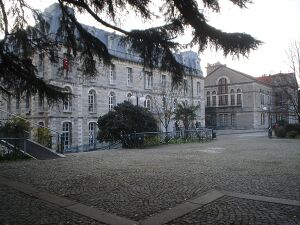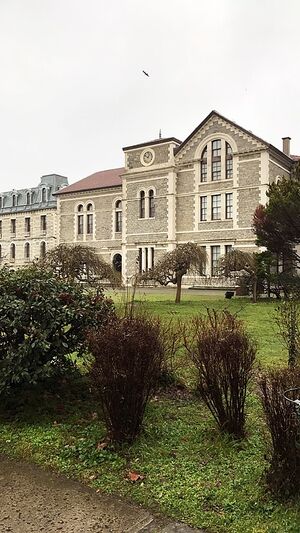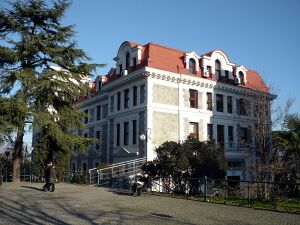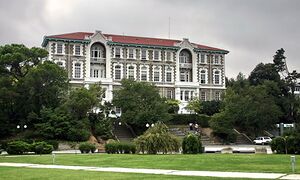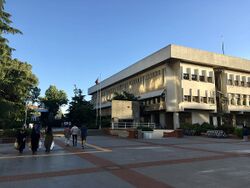Boğaziçi University
(University) | |
|---|---|
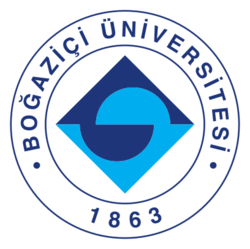 | |
| Formation | 1863 |
| Headquarters | |
| Type | Public |
| Turkish elite university with strong ties to the American educational system. | |
Boğaziçi University (Boğaziçi Üniversitesi) is a major research university in Istanbul, Turkey. Its main campus is located on the European side of the Bosphorus strait. It has four faculties and two schools offering undergraduate degrees, and six institutes offering graduate degrees. The language of instruction is English.
Founded in 1863, as Robert College, it is the first American higher education institution founded outside the United States. Though under entirely Turkish administration today, the university still maintains strong ties to the American educational system.
Boğaziçi University consistently ranks highest in Turkey, having the greatest number of applicants via the TYT-AYT Turkish university entrance examinations.[1] The well-known programs are electrical and electronics engineering,[2] computer engineering,[3] and industrial engineering.[4] Only the top 800 of the approximately 1.8 million participants in the annual Turkish university entrance examination (TYT-AYT) are admitted to register for these subjects at the University.[1] To be admitted into other degree programs, one usually has to be in the top 1% of the university entrance exam as well. This allows Boğaziçi University to attract many of the highest scoring students;[5] as well as having the most preferred applied science, education, engineering, and social science programs in Turkey.[6][7]
History
In 1863, Robert College was founded in Bebek by Christopher Robert, a wealthy American philanthropist, and Cyrus Hamlin, a missionary devoted to education. Six years after its foundation, with the permission of the Irade-i senniye of the Ottoman Sultan, the first campus (the current-day South Campus) was built in Bebek at the ridge of the Rumelian Castle, very close to a Bektashi tekke, whose leaders maintained an excellent relationship with the Congregational and Presbyterian founders of Robert College, according to Dr. Friedrich Schrader, a German lecturer at Robert College during the 1890s.[8] The first building of the school was named "Hamlin Hall" in memory of Cyrus Hamlin. In 1878, Christopher Robert died. According to the article A Millionaire's Will, published in The New York Times (27 November 1878), Robert left a great portion of his wealth to the college.[9]
A College Catalog was compiled in 1878–1879, giving general information and an outline of the courses of study. Defining the aims of the college the catalog stated: "The object of the College is to give to its students, without distinction of race or religion, a thorough educational equal in all respects to that obtained at a first-class American college and based upon the same general principles."[citation needed]
After Hamlin, Robert College was administrated by George Washburn (1877–1903)[10] and Caleb Gates (1903–1932). Though founded at the time of the Ottoman Empire as an institution of higher learning serving the Christian minorities of the Empire as well as foreigners living in Constantinople, the school adopted a strictly secular educational model in accordance with the republican principles of Turkey in 1923. Robert College, in the past had junior high school, high school, and university sections under the names Robert Academy, Robert Yüksek and American College for Girls. Since 1971, the current-day Robert College has functioned only as a "high school"[11] (more comparable to the French lycée in academic rigor) on its Arnavutköy campus (formerly the campus of American College for Girls), yet it retains the title of 'College'. The Bebek campus and academic staff were turned over to the Republic of Turkey for use as a public university named Boğaziçi University, the renamed continuation of Robert College's university section.
{{quote|"Through the education of succeeding generations of students, Robert College has assisted the economic and social progress in the Near East. It has also brought direct benefits to several generations of Americans—faculty members, trustees, students, contributors, and other friends of the College. Their close association with the heroic and hospitable people of Turkey has led to a greater appreciation of Turkish life and culture and the strong foundations on which the Republic of Turkey, our close friend and partner in peace, has been built. I send my cordial congratulations to the officers and friends of Robert College on the century of service you are so deservedly celebrating." | John F. Kennedy, President of the United States|Message for the Centennial Celebrations of Robert College, 1963[12]
Campus
Boğaziçi University operates on six campuses in Istanbul. Four of these campuses (South Campus, North Campus, Hisar Campus, and Uçaksavar Campus) are close to each other and located on a hill in the affluent district of Bebek on the European side of Istanbul, overlooking the Bosphorus (hence the name). The Kennedy Lodge, named after John F. Kennedy, is located at the South Campus and operates as a welcoming facility for visiting professors and staff. The Kandilli Campus is right across from the shore, located on the Asian side of Istanbul (in Çengelköy) and hosts the Kandilli Observatory and Earthquake Research Institute (KOERI). The newest campus is in Kilyos on the Black Sea coast and is home to a private beach. The South Campus is the most popular campus among students and visitors alike. [13]
Employee on Wikispooks
| Employee | Job | Appointed | End |
|---|---|---|---|
| Serif Mardin | Leader of the Economical and Political Sciences Department | 1976 | 1979 |
Alumni on Wikispooks
| Person | Born | Died | Nationality | Summary | Description |
|---|---|---|---|---|---|
| Mustafa Akyol | 20 February 1972 | Turkey | Author Journalist | Single Bilderberg Turkish journalist and author arguing for Islamic liberalism | |
| Senem Aydın-Düzgit | Turkey | Academic | Single Bilderberger Turkish academic. Opponent of Prime Minister Recep Tayyip Erdoğan, strongly for the European Union. Published about COVID-19 | ||
| Enis Berberoğlu | 1 April 1956 | Turkey | Politician | Turkish politician and journalist sentenced in 2017 to 25 years in prison on spying charges | |
| Cem Boyner | 23 September 1955 | Turkey | Businessperson | Turkish businessman. Selected a Global Leader for Tomorrow by the World Economic Forum in 1994, and attended the 1995 Bilderberg meeting, just as he was going from leader of the Turkish Industry and Business Association to an attempted political career. | |
| Ahmet Ünal Ceviköz | 6 November 1952 | Turkey | Diplomat | Former Turkish ambassador to the UK. He attended the Bilderberg for the first time in 2019. | |
| Emre Erdoğan | Turkey | Academic | Attended Bilderberg 2022 as a professor of political science at Istanbul Bilgi University | ||
| Meral Gezgin Eriş | 1957 | Turkey | Businessperson | Lobbyist for Turkish membership of the European Union. | |
| Suna Kıraç | 3 June 1941 | 15 September 2020 | Turkey | Businessperson | Turkish Koç family Bilderberg Steering Committee member paralysed with amyotrophic lateral sclerosis |
| Metin Sitti | Turkey | Academic | Scientis with interest in microrobotics and nanotechnology | ||
| Serpil Timuray | 7 July 1969 | Turkey | Businessperson | Turkish businesswoman in multinational companies. | |
| Arzuhan Yalçındağ | 1965 | Turlkish | Businessperson | Owner of one of the biggest media groups in Turkey | |
| Ruşen Çakir | 25 January 1962 | Turkey | Journalist | Part of the George Soros/ NED network | |
| Murat Çetinkaya | 1976 | Turkey | Economist Central banker | Governor of the Central Bank of the Republic of Turkey 2016-2019 | |
| Behlül Özkan | Turkey | Academic | Turkish Bilderberger academic focusing on Political Islam in Turkey. Hostile to the Islamist government of President Recep Tayyip Erdoğan. | ||
| Cüneyt Ülsever | 1951 | Turkey | Journalist Academic Economist | Turkish journalist with massive education from the US |
References
- ↑ Jump up to: a b [1] 2019 YKS SONUÇLARINA GÖRE BOĞAZİÇİ ÜNİVERSİTESİ BÖLÜMLERİNİN TAVAN-TABAN PUANLARI VE SIRALAMALARI
- ↑ [2] BOUN EE
- ↑ [3] BOUN CmpE
- ↑ [4] BOUN IE
- ↑ İlk 1000 Universielere göre dağılım Archived 31 March 2010 at the Wayback Machine. Boğaziçi University
- ↑ Belgeler OSYM
- ↑ https://books.google.com/books?id=w7xwCgrf4qgC&pg=PA184%7Ctitle=Higher Education Management and Development. Compendium for Managers|first1=Jeroen|last1=Huisman|first2=Attila|last2=Pausits|date=23 April 2019|publisher=Waxmann Verlag|via=Google Books|isbn=9783830972860}}
- ↑ Friedrich Schrader in: Robert College, Nord und Süd, November 1919, S. 165–169 (Article in German language)
- ↑ https://timesmachine.nytimes.com/timesmachine/1878/11/27/80737631.pdf
- ↑ George Washburn |title=Dictionary of American Biography |year=1936 |http://ic.galegroup.com/ic/bic1/ReferenceDetailsPage/ReferenceDetailsWindow?displayGroupName=Reference&disableHighlighting=false&prodId=BIC1&action=e&windowstate=normal&catId=&documentId=GALE%7CBT2310001134&mode=view&userGroupName=fairfax_main&jsid=84b1000581e1d9869bb2331e29a70ac0
- ↑ https://web.archive.org/web/20120222152940/http://portal.robcol.k12.tr/Default.aspx?pgID=18&ST=1
- ↑ https://web.archive.org/web/20070620104825/http://www.robcol.k12.tr/alumni/rcq/23/cover%20story-3.pdf
- ↑ Main campus Archived 21 March 2009 at the Wayback Machine. Boğaziçi University
